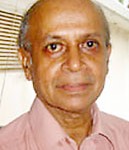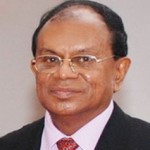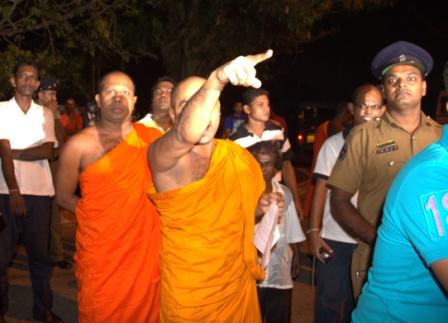–

Prof Suresh Canagarajah
Prof. Suresh Canagarajah
It is a pleasure to be back in my alma mater on its 190th anniversary. All old boys will agree that we owe a lot to St John’s College for all that we have achieved here in Sri Lanka and abroad in our personal and professional lives. I want to start with two brief stories to demonstrate how the foundation provided by St John’s has helped me in my academic career. I hope that these stories show our students how a strong and meaningful early education is important for our success.
When I went to the US for graduate education from University of Jaffna, I was worried that the knowledge there would be so advanced that I won’t be able to follow the courses. For one particular course, I thought I should talk to the professor before the class to see if he would recommend that I delay following that course. Professor John Baugh spoke with me for about ten minutes and asked me what books I had read in my field and which scholars I knew. Half way through the conversation, his eyes widened, and he said, “Do you realize that you are one of the most widely read students in this department? You obviously have good reading skills and academic training. Where did you get this educational foundation?”
My mind immediately went to my training at St John’s. From my early grades here, St John’s has always reserved time for the library. Students were taken to the Handy Library for a whole class period, to learn how to search for books, get familiar with the cataloguing system, and read quietly without talking to others in the silence of the library. That experience trained me in many things. It developed an appreciation for books, it disciplined me to focus on the reading, and it inculcated patience to read without distractions. It is this training that helped me to cultivate my reading habit. When I went to the US, I found that I was not only ready for my graduate education, I could also overcome the new academic challenges I faced there because of the reading skills St John’s had developed in me.
My second story relates to the skills of public speaking and memory. The college has always reserved time for literary associations, speech competitions, and concerts. Particularly challenging to me was the Tamil Oratory competition in upper school. We were provided a choice of topics, given a few hours to prepare, and then expected to stand before three judges and the audience to deliver the speech. This competition required good skills of thinking, planning, memory, and spontaneous delivery. This is because the time given was not enough to write a whole speech and read it. The skills I developed from this experience still remain with me. I still prepare the outline of my talk mentally, organize the points effectively, and speak without writing down the whole speech. This skill sometimes surprises my listeners. Recently, a senior professor from the US took me aside after I gave the keynote in a major professional conference and whispered: “That was a great talk. But tell me the truth: you wrote the talk and then memorized it, right?” She was surprised by my memory (that I can speak for an hour without notes), organization skills (that the talk was still very coherent), and delivery (that it was done with confidence). I had to explain that the talk wasn’t written or memorized. I had developed all the skills she mentioned during my early education at St John’s.
What is interesting about both examples is that these skills of reading, speaking, thinking, and planning cannot be developed on a single day or in a short time. You can’t develop them simply before an examination or a lecture. They take time to develop. It is for this reason that a solid educational foundation is important. The habits and practices we develop in childhood support us in the challenges we face later in life. They develop further and help us achieve even more complex and demanding tasks. Many scholars think that some of these skills are dying today. Young people are losing the discipline of reading consistently for a long period of time because technology offers them instant and disconnected messages from multiple media. Memory is impoverished as students depend on readymade sources for information and are not expected to remember them for future use. I would suggest that the skills St John’s developed in me are still valuable and have helped countless former students succeed in their education and professions.
These skills are part of the tradition of St John’s. From its very beginning, the college has given a high place for these skills. The first school library association was started in 1890. There are other Johnian traditions everyone in Jaffna and even in Sri Lanka talks about. The college is well known for developing a solid background in English, cultivating a good discipline, and providing a balanced education that includes spirituality, sports, and extracurricular activities. However, we cannot remain satisfied with these traditions. When we have profound social changes around us, both locally and globally, we have to reconsider what new traditions we have to develop to serve our students and communities better. So, I want to focus in this talk on five changes we need in education to respond to the changes around us. To make it easier for students to remember them, each of the changes I propose starts with the letter C. Let me see if you can remember them after this talk!
The first change to consider is orientating to learning as creative. We have to focus on creating new knowledge rather than repeating old knowledge. There has been an observation that while western communities are good in inventing new things, eastern communities are good in applying and implementing them. Is there something in the culture of the western people that values novelty, while eastern people value tradition and orthodoxy? This attitude to knowledge could also be because we in Asia give so much importance to examinations, which cultivate a focus on established knowledge and the ability to repeat it. However, learning involves more than passing an examination. Our students have to also produce new findings, discover new knowledge, and invent new technology. If not, we will always be followers of other communities rather than leaders. We will also not be able to develop our own communities in the ways that are relevant for us.
Consider how students are encouraged to be creative in the United States. Every year, there are nationwide science competitions for school students to display their new inventions. One of the winners in this year’s competition was Eesha Khare from California, whose parents come from India. She produced a supercapacitator, a gadget that will fully charge cell phones in 20 seconds, in extremely short time. She won a prize of 50,000 dollars, which she is going to use to attend Harvard. These inventions are not playful. They actually lead to industrial production and make real changes in people’s lives. Eesha is already courted by major high tech companies. They say “Necessity is the mother of invention.” In our community now, we have a lot of need. We have experienced a lot of destruction during the war. You can invent things that make a difference in the lives of our people.
Change number two: learning should be critical. By critical, I mean that we should have a questioning attitude towards knowledge and facts. This is connected to the previous change. We cannot be creative without questioning old knowledge. Asian communities don’t always encourage a questioning attitude because they believe that authorities such as parents, teachers, and leaders know what is right for everyone. Questioning is discouraged because it is considered a challenge to those in authority. I think the tragedies of our community in our recent history have resulted from our inability to question our leaders. Eventually, such an unquestioning attitude led to destructive policies and actions.
However, questioning doesn’t mean rejecting everything that our community holds as important. A critical learning can actually help us understand and appreciate our traditions and values. It can also help us understand our limitations and work towards formulating new values and traditions. Questioning can start from what goes in our schools and go all the way to what goes in our country and even in the world. Consider how students in a school in the United States, Wilcox County High School in Georgia, engaged in critical thinking. Their school had a tradition of holding two year-end parties—one for white students, the other for colored students. This April, some students thought this tradition was flawed. They wanted to establish a new tradition in which students from all the races can have one unified party. A group of four students from different racial backgrounds organized a committee to plan this party. There was considerable opposition from their town. There was talk that these students will be punished or ostracized. However, these students didn’t give up. Eventually, when they held a successful party for all the racial groups, their story was in the national news media. They were applauded by the whole country for inventing a new tradition for their school.
Change number three: learning as civic. Civic means relating to the community we live in and being good citizens. Do we see our learning connected to making a better living condition for our community? Or do we engage only in learning for the sake of learning? If our only objective in going to school is to get all A’s in the AL examinations, learning is not civic. It is selfish. Our competitive examinations have made us focus only on displaying our own mastery of knowledge, rather than considering how this knowledge can be used in the service of our community. The civic attitude can enhance learning rather than distracting students from education.
Consider the example of civic learning from a school in the United States. In the city of Madison some years back, teachers in a high school divided their students into small groups and gave them projects relating to some burning issues in their community. Students had to study the problem and write a report on how to solve it. One group focused on the increasing rates of asthma in their town. The four students divided the responsibilities among themselves. One student visited local communities and talked to parents and leaders about their view that pollution was causing asthma. Another student interviewed the municipal authorities in the town on sanitary conditions. The third student did library research on news reports and scholarly research on the connection between asthma and environmental pollution. The fourth student interviewed scientists in the local university to understand how pollution caused asthma. As they conducted this project, the students were sharpening their learning skills—they were reading advanced research and news material; they were developing interviewing skills; they were writing reports on what they observed and learned. Their motivation to solve the problem in their community made all this learning interesting and engaging. Eventually, they wrote a combined final report on their recommendations on how reducing environmental pollution can reduce the rate of asthma and submitted it to the mayor. When they connected their education to solving a problem in their community, the students found learning motivating, meaningful, and enjoyable.
That example also illustrates the fourth change I wish to propose: learning as collaborative. What we see in the Madison example is how students work together, pool their collective strengths, and collaborate in solving a problem. There is more strength and more knowledge when four people put their heads together. More importantly, collaborative learning develops a new attitude and value towards learning, based on cooperation. The examination-based learning in our community has developed in us a lot of selfishness. Each student for himself or herself, seems to be the guiding principle. We are expected to show how we can outsmart the other students. However, in the adult world of work, we need to collaborate with others to solve problems or implement changes.
While collaboration between students is important, another sort of collaboration now involves teachers and students. Even teachers are adopting the attitude that they are not there to lecture to students, pretend they are the sole authorities on all kinds of knowledge, or give the right answers that have to be accepted uncritically. Teachers now think of themselves as facilitators of learning. They arrange the class, texts, and assignments in such a way that students can collaborate with each other and with teachers to learn creatively and critically. In my teaching in the US, I am always open to the possibility that some students might know more about certain areas or topics than me. When I am asked a question for which I don’t know the answer, I immediately confess that and promise to find it out in the next class rather than giving students a false answer simply to save my honor. I am open to being challenged by students on some of my positions, and engage in a dialogue with them to move to a higher understanding. Rather than portraying me as a weak teacher, this collaborative attitude actually shows that I am strong and confident. I know what I know that I can be humble about my limitations and be open to learning new knowledge from others.
This attitude is going to be difficult for Sri Lankan teachers who are treated like Gods. I want to discuss a particularly controversial practice in our teaching in this country that is drawing a lot of attention these days: Caning, or corporal punishment. Recently, I have received many email messages from Tamil people living abroad. They tell me: Teachers in Sri Lanka seem to have no limits on how they can use either the cane or their own hands in hitting their students. In some cases, this goes beyond punishment to physical abuse. Students end up with marks all over their body. We have to start a discussion in our community on the relative effectiveness of caning versus non-physical punishment.
Physical punishment has been banned in many countries. It has been absent from French schools since the 19th century. In 2008 a teacher was fined for slapping a student in France. In UK, in state-run schools, and also in private schools where at least part of the funding came from government, corporal punishment was outlawed by Parliament with effect from 1987. The Supreme Court of Canada outlawed caning in 2004. In the US, it is left to each state to develop a policy for schooling. Majority of the states have banned caning in public schools. New Jersey was the earliest to ban it in 1867. Physical punishment has also been banned from many socialist countries because they believe that it is contrary to socialist values. From the 1917 revolution onwards, corporal punishment was outlawed in Russia and the Soviet Union. Other socialist countries have followed this practice. In all these countries, if a teacher hits a student, he or she will be taken to the courts.
However, not caning or hitting the student doesn’t mean not punishing. Punishment is important for cultivating discipline. But certain non-corporal forms of punishment can be more effective. For example, my 11 year old son is very talkative in the class. He is very naughty and gets punished a lot. But he has never been slapped or caned. Teachers have many other good options. They can detain him after school or keep him in the class while others are playing during the interval. When other students earn reward points for being good, he will lose his points. These points are used at the end of the school year to buy things donated by parents. In the worst case, the parents can be called up (which my wife and I did once) or he can be suspended from school (which hasn’t happened to him yet: Thank God!). Some of these forms of punishment are very effective because they motivate my son to be good on his own recognition. He has the choice of either earning points or losing them, and suffer the consequences at the end of the year. So, caning motivates students negatively through fear and pain, rather than positively by encouraging students to do better.
I know that many parents and teachers in our community feel “aTiyaata maaTu paTiyaatu” and feel that caning is the only form of effective punishment. But soon we have to come to terms with the changing orientations to punishment and schooling around the world. We are living in a connected world where events and practices in one community are relayed to others in a matter of minutes. If a student in Jaffna gets beaten this morning, his uncles, aunts, and cousins in UK, Canada, Australia, and the US know within minutes how many times he was beaten, how many marks he has on his body, and which doctor he was taken to. So many Tamil people abroad have started asking: “Why is this primitive practice still continuing in our community? Why are teachers so abusive, angry, and out of control with their students? Are teachers taking out their own frustrations on their students? Is caning a legalized form of cruelty in our community? Is caning a reflection of how our community has become comfortable with violence after many years of war?”
That brings me to the final point: learning as cosmopolitan. Cosmopolitan means being a global citizen. Today we cannot separate ourselves from developments in other communities. As I just mentioned, we cannot think anymore that what we do in Jaffna will remain isolated in Jaffna. Within minutes it is known all over the world. More broadly, our fate is interconnected with the fate of other communities. Think of the global economic crisis, climate change, nuclear arms, and environmental pollution. What one community does affects all of us. So, it is important for our students to develop the attitudes, values, and orientations to consider other cultures and people. However, being cosmopolitan doesn’t mean losing our own values and identity. A better approach is to be proud of who we are, as we engage with other cultures. This is a two-way process. We can evaluate the things we learn from others from the point of view of our own culture and society. But we should also be open-minded so that we can be self-critical and change our values and traditions. In fact, when we engage with other cultures and learn new perspectives, we might in fact rediscover the secrets and wisdom of our communities that we may have forgotten over time.
Let me apply cosmopolitanism to my talk this morning. Are the new traditions of learning I am proposing influenced by my engagement with other cultures? To some extent they are. I am now a teacher educator—that means a person who trains others to be teachers. What I have shared with you are the principles that guide my teaching philosophy when I teach students from US and many other countries to become good teachers. However, remember that I started this talk by appreciating some of the traditions St John’s shaped me with—i.e., reading, speaking, thinking, and planning. I criticized many trends in the western world—such as instant communication and multi-tasking—that are leading young people to losing these important skills. St John’s should continue to develop the positive traditions in its history. However, there are other ways in which St John’s should develop a new educational tradition—namely,learning as creative, critical, civic, collaborative, and cosmopolitan. Even these are not new to our culture. My engagement with other cultures helps me rediscover elements in our culture that we may have forgotten. So think about Auvayaar’s saying “kaTRatu kai maNNaLavu kallaatatu uLakaLavu” (i.e., What we know is a fistful, what we don’t know is a world full.) This verse reminds us why we have to think of learning as creative, collaborative, and critical. No one can be satisfied with what we already know. We have to constantly critique what we accept as truths. Or think of Puranaanuuru: “yaatum ooree yaavarum keeLir” (i.e., Every place is our village, every person our kin). This verse reminds us of the importance of cosmopolitanism and engaging in civic learning that is useful to all people.
The changes that I spell out this morning have also been present in the missionary history of our school. Just think of the founder of our school Joseph Knight. When he came to Sri Lanka in July 1818, he was a representative of the Church Missionary Society. This society opposed the practice of treating Africans as slaves. They thus displayed critical thinking. Before he started classes for local students in Nallur, he first learnt Tamil language with the help of a local Hindu priest. It must have been difficult for both parties to engage in such learning. Knight would have thought of the Hindu priest as a heathen, and the priest would have thought of Knight as unclean. It is said that the Hindu priest used to stop by at a village well after these classes to cleanse himself before he went home. Despite their cultural differences, both people collaborated in learning from each other. That was not only collaborative learning, it was also cosmopolitanism. Both didn’t change their own systems of belief; but that didn’t prevent them from cooperating and learning from each other and enriching their world view. Knight went on to lay the foundation for the first Tamil/English bilingual dictionary. When the Winslow’s Comprehensive Tamil and English Dictionary was published in Madras in 1862, the preface acknowledges how Rev. Knight had started and contributed to this project. That was civic learning—i.e., knowledge that was useful to other people. There is also creativity, because Knight sought new knowledge. He started a comparative exploration of Tamil and English that we are still continuing today. Knight went on to start lessons for 7 students in his house in March 1823, before renovating the decaying Old Dutch Church at Nallur and getting permission from the government to start a school there. Motivated by a vision and sprit of service, Knight established a new institution and invented new traditions that have gone on to be a blessing to thousands of youth in our town.
Today there is a similar challenge for all of us to be missionaries, path breakers, tradition-builders in our community. With one history of our community coming to an end, we are in the beginning of another. We are almost starting from scratch. Buildings have been demolished, community leaders killed, families displaced, students orphaned. The question for our school is: what kind of education is going to address the changes around us. The task of slowly rebuilding our community is starting. Old boys have been sending money to St John’s to put up new buildings and support displaced and orphaned students. But an important question everyone is asking now is this: St John’s is proud of the new buildings it has put up; but is it paying enough attention to building the moral, spiritual, and intellectual life of its students? Should the school be more interested in building up the quality of education needed for the new age?
This is the time to initiate new traditions of learning and education for St John’s College. Though we may be materially disadvantaged, we are still culturally, spiritually, and intellectually rich. Buildings may be destroyed; but nothing can destroy our mind and soul. Nothing can stop someone’s mind from growing, influencing others, shaping the environment around us, conquering disadvantages, and achieving great things. This is the story of Johnians from the past. We grew up in a disadvantaged community, with less buildings than you have now. But that didn’t stop us from achieving impressive things on the global stage. It was not about what material resources we had. It was about what cultural, spiritual, and intellectual resources we developed in our community. You students can still achieve all that. You can develop to be powerful inventors, thinkers, and leaders, though now you may not have a house over your heads, family to care for you, or enough things to provide a comfortable life. Remember our school motto: “Light shineth in darkness”. It is precisely at this time in our history that we are called upon to shine. And the only thing light can do, something that comes naturally to it, is shine! I wish the staff of St John’s college, the parents, the local community, and especially the students the very best as they work towards building more meaningful educational traditions for the future.
Speech by Prof. Suresh Canagarajah,Edwin Erle Sparks Professor of Applied Linguistics and English, Pennsylvania State University, USA, at the THE ANNUAL PRIZE GIVING was held on Saturday 6th July, 2013, at St.John’s college Jaffna in Sri Lanka
















